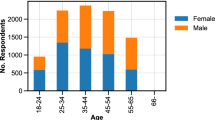Abstract
Theoretical models suggest that attitudes toward an employer's drug testing policy affect organizational climate and employee behavior, but empirical evidence has been scarce with limited external validity. Based on 66 manufacturing employees' questionnaire responses, attitudes toward drug testing significantly correlated with attitudes toward top management (r = +.39), support for employee safety (r = +.34), turnover intentions (r = −.31), and other variables. Although these data support a link between attitudes toward drug testing and employee withdrawal, they cannot address the issue of causality. Results suggest that perceived invasion of privacy is more strongly related to climate perceptions and turnover intentions than is perceived fairness.
Similar content being viewed by others
REFERENCES
Allen, N. J., & Meyer, J. P. (1990). The measurement and antecedents of affective, continuance and normative commitment to the organization. Journal of Occupational Psychology, 63, 1–18.
Crant, J. M., & Bateman, T. S. (1989). A model of employee responses to drug-testing programs. Employee Responsibilities and Rights Journal, 2, 173–190.
Crant, J. M., & Bateman, T. S. (1990). An experimental test of the impact of drug-testing programs on potential job applicants' attitudes and intentions. Journal of Applied Psychology, 75, 127–131.
Greenberg, J. (1987). A taxonomy of organizational justice theories. Academy ofManagement Review, 12, 9–22.
Ironson, G. H., Smith, P. C., Brannick, M. T., Gibson, W. M., & Paul, K. B. (1989). Construction of a Job in General scale: A comparison of global, composite, and specific measures. Journal of Applied Psychology, 74, 193–200.
Jones, R. A. (1977). Self-fulfilling prophecies: Social, psychological, and physiological effects of expectancies. New York: John Wiley & Sons.
Kanungo, R. N. (1982). Measurement of job and work involvement. Journal of Applied Psychology, 67, 341–349.
Konovsky, M. A., & Cropanzano, R. (1991). Perceived fairness of employee drug testing as a predictor of employee attitudes and job performance. Journal of Applied Psychology, 76, 698–707.
Krzystofiak, F., Cardy, R., & Newman, J. (1988). Implicit personality and performance appraisal: The influence of trait inferences on evaluations of behavior. Journal of Applied Psychology, 73, 515–521.
Landy, F. J., Shankster, L. J., & Kohler, S. S. (1994). Personnel selection and placement. Annual Review of Psychology, 45, 261–296.
Litwin, G. H., & Stringer, Jr., R. A. (1968). Motivation and organizational climate. Boston, MA: Harvard University.
Mastrangelo, P. M. (1997). Do college students still prefer companies without employment drug testing? Journal of Business and Psychology, 11, 325–337.
Mastrangelo, P. M., & Popovich, P.M. (1995, September). Measuring applicants and employees' attitudes toward specific drug testing policies. Poster session presented at the Third Interdisciplinary Conference on Occupational Health, Washington, DC.
Mirels, H. L. (1982). The illusory nature of implicit personality theory: Logical and empirical considerations. Journal of Personality, 50, 203–222.
Murphy, K. R., & Thornton III, G. C. (1992a). Development and validation of a measure of attitudes toward employee drug testing. Educational and Psychological Measurement, 52, 189–201.
Murphy, K. R., & Thornton III, G. C. (1992b). Characteristics of employee drug testing policies. Journal of Business and Psychology, 6, 295–309.
Murphy, K. R., Thornton III, G. C., & Prue, K. (1991). Influence of job characteristics on the acceptability of employee drug testing. Journal of Applied Psychology, 76, 447–453.
Murphy, K. R., Thornton III, G. C., & Reynolds, D. H. (1990). College student's attitudes toward employee drug testing programs. Personnel Psychology,43, 615–631.
Raciot, B. M., & Williams, K. J. (1993). Perceived invasiveness and fairness of drug-testing procedures for current employees. Journal of Applied Social Psychology, 23, 1879–1891.
Reid, L. D., Murphy, K. R., & Reynolds, D. H. (1990). Drug abuse and drug testing in the workplace. In Murphy, K. R., & Saal, F. E. (Eds.), Psychology in organizations: Integrating science and practice (pp. 241–269). Hillsdale, NJ: Lawrence Erlbaum Associates Publishers.
Rosse, J. G. (1988). Relations among lateness, absence, and turnover: Is there a progression of withdrawal? Human Relations, 41, 517–531.
Rosse, J. G., Ringer, R. C.,& Miller, J. L. (1996). Personality and drug testing: An exploration of the perceived fairness of alternatives to urinalysis. Journal of Business and Psychology, 10, 459–475.
Rynes, S. (1993). Who's selecting whom? Effects of selection practices on applicant attitudes and behavior. In N. Schmitt, W. C. Borman, & Associates (Eds.), Personnel selection in organizations. San Francisco, CA: Jossey-Bass, Inc.
Smith, L. (1996, September 18). If you want a job, better ‘just say no.’ The Washington Post, pp. A1, A14, A16.
Smither, J. W., Millsap, R. E., Stoffey, R. W., Reilly, R. R., & Pearlman, K. (1996). An experimental test of the influence of selection procedures on fairness perceptions, attitudes about the organization, and job pursuit intentions. Journal of Business and Psychology, 10, 297–318.
Smither, J. W., Reilly, R. R., Millsap, R. E., Pearlman, K., & Stoffey, R. W. (1993). Applicant reactions to selection procedures. Personnel Psychology, 46, 49–76.
Steel, R. P.,& Ovalle, N. K. (1984). A review and meta-analysis of research on the relationship between behavioral intentions and employee turnover. Journal of Applied Psychology, 69, 673–686.
Stone, D. L., & Kotch, D. A. (1989). Individuals' attitudes toward organizational drug testing policies and practices. Journal of Applied Psychology, 74, 518–521.
Author information
Authors and Affiliations
Rights and permissions
About this article
Cite this article
Mastrangelo, P.M., Popovich, P.M. Employees' Attitudes Toward Drug Testing, Perceptions of Organizational Climate, and Withdrawal from the Employer. Journal of Business and Psychology 15, 3–18 (2000). https://doi.org/10.1023/A:1007783900650
Issue Date:
DOI: https://doi.org/10.1023/A:1007783900650




